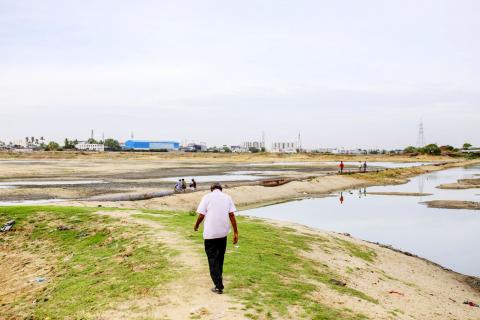India’s steelmakers, more accustomed to securing raw materials such as iron ore and coal, are keeping another key resource in their sights: Water.
Two of India’s biggest steelmakers — JSW Steel Ltd and Tata Steel Ltd — and metal producer Vedanta Ltd have flagged risks due to water shortages in the past month as the world’s second-most populous country faces an unprecedented water crisis, with taps running dry in one of its biggest cities this year.
Competition for the resource is set to grow in India, where nearly one-third of the country is water-stressed, increasing costs and risks for companies. A delayed monsoon, which accounts for 70 percent of the nation’s annual rainfall, has exacerbated the situation this year.

Photo: Bloomberg
“The urgency surrounding water supply risks is not lost in our discussions with companies, but the talking is still happening behind closed doors,” said Damandeep Singh, director at CDP, which runs a global disclosure system for companies and others to report environmental risks. “The problem is that when companies in India get water, they get it cheap. There’s no incentive to manage a resource when it is available so cheap.”
Water is shaping up to be a serious economic risk in Asia’s third-largest economy. Desertification, land degradation and drought cost India about 2.54 percent of GDP in 2014 and 2015, according to a study last year by the Indian Ministry of Environment, Forest and Climate Change.
In a global survey of miners, just under half of the respondents reported a financial impact of US$11.8 billion over five years thanks to water-related problems such as droughts, increased water stress and flooding, according to a CDP report last year.
India’s second-biggest steel mill, JSW Steel, has built a new reservoir with 36.8 million cubic meter storage capacity at its plant in the water-scarce southern state of Karnataka to ensure adequate supply for uninterrupted operations, the Sajjan Jindal-owned company said in its annual report on Thursday last week.
Top producer Tata Steel is also investing in sewage treatment plants to process water for reuse and creating new rainwater harvesting structures to improve the groundwater table. Water is used as a coolant in the steelmaking process and more than 3m3 of fresh water is required per ton (0.9 tonnes) of crude steel produced, it said in the annual report last month.
Billionaire Anil Agarwal’s Vedanta performed a water risk assessment at 25 of its most significant business locations and found that its operations in Rajasthan, Punjab and Tamil Nadu had a greater risk of shortages than elsewhere because of competitive pressures for water usage in those regions, the Mumbai-based company said in its annual report last month.
About 600 million Indians are facing high-to-extreme water stress and the situation is set to worsen as water requirements rise, according to a report last year by NITI Aayog, the Indian government’s policymaking body.
Water demand is expected to be twice the available supply by 2030, implying severe water scarcity for hundreds of millions of people and an about 6 percent loss in India’s GDP, it said.
Greater demand for resources and extraction of mineral reserves in often water-scarce locations, where stable supply of water is no longer guaranteed, continues to jeopardize existing and future operations, CDP said.
“Companies including miners have been taking water for granted for the longest period,” Singh said. “They are still taking an ostrich-in-the-sand approach.”

Intel Corp chief executive officer Lip-Bu Tan (陳立武) is expected to meet with Taiwanese suppliers next month in conjunction with the opening of the Computex Taipei trade show, supply chain sources said on Monday. The visit, the first for Tan to Taiwan since assuming his new post last month, would be aimed at enhancing Intel’s ties with suppliers in Taiwan as he attempts to help turn around the struggling US chipmaker, the sources said. Tan is to hold a banquet to celebrate Intel’s 40-year presence in Taiwan before Computex opens on May 20 and invite dozens of Taiwanese suppliers to exchange views

Application-specific integrated circuit designer Faraday Technology Corp (智原) yesterday said that although revenue this quarter would decline 30 percent from last quarter, it retained its full-year forecast of revenue growth of 100 percent. The company attributed the quarterly drop to a slowdown in customers’ production of chips using Faraday’s advanced packaging technology. The company is still confident about its revenue growth this year, given its strong “design-win” — or the projects it won to help customers design their chips, Faraday president Steve Wang (王國雍) told an online earnings conference. “The design-win this year is better than we expected. We believe we will win

Chizuko Kimura has become the first female sushi chef in the world to win a Michelin star, fulfilling a promise she made to her dying husband to continue his legacy. The 54-year-old Japanese chef regained the Michelin star her late husband, Shunei Kimura, won three years ago for their Sushi Shunei restaurant in Paris. For Shunei Kimura, the star was a dream come true. However, the joy was short-lived. He died from cancer just three months later in June 2022. He was 65. The following year, the restaurant in the heart of Montmartre lost its star rating. Chizuko Kimura insisted that the new star is still down

While China’s leaders use their economic and political might to fight US President Donald Trump’s trade war “to the end,” its army of social media soldiers are embarking on a more humorous campaign online. Trump’s tariff blitz has seen Washington and Beijing impose eye-watering duties on imports from the other, fanning a standoff between the economic superpowers that has sparked global recession fears and sent markets into a tailspin. Trump says his policy is a response to years of being “ripped off” by other countries and aims to bring manufacturing to the US, forcing companies to employ US workers. However, China’s online warriors